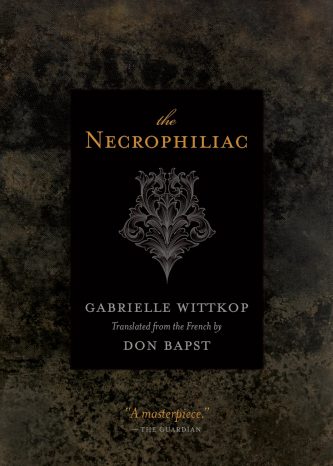 By GABRIELLE WITTKOP (ECW Press; 1972/2011)
By GABRIELLE WITTKOP (ECW Press; 1972/2011)
Very likely the last word on necrophilia, this legendary 1972 French novella is available in English at last. The translator was novelist/filmmaker Don Bapst, who’s done superlative work on a text that’s every bit as lyrical and poetic as the French original is said to be. Beyond that I believe THE NECROPHILIAC is best categorized by what it isn’t: refined, polite or sparing to the sensibilities of squeamish readers.
The narrator is Lucien, a loner who spends his days working in an antique shop inherited from his father. His nights are spent methodically searching for corpses to ravish, as his sexual preferences are confined solely to the deceased. He’s not a murderer, viewing the infliction of mortal suffering as the “one dirty thing,” although he does admit that “I can’t see a pretty woman or a handsome man without immediately wishing he or she were dead.” As that quote indicates, his sexual tastes encompass both male and female corpses.
Lucien’s account of his life and loves is in the form of a diary that’s highly episodic in scope. He relates how as a child he discovered masturbation on the very day his mother dropped dead, a juxtaposition that apparently led to his present condition.
Apparently “the dead always have surprises to share,” as evinced by a corpse that vomits black gunk while being defiled, another that degrades from too many baths—“his greening stomach sinks in, rumbling with bad flatulence that bursts into enormous bubbles in the bathwater”—and another who inexplicably absorbs Lucien’s sperm into her body. A few of his conquests even provide something beyond sexual companionship, such as Suzanne, with whom Lucien sequesters himself in an all-consuming two week love fest, and a brother and sister who’ve committed suicide, with whom Lucien becomes so enamored he can’t bring himself to defile their corpses, merely positioning them on his bed and watching them decay. The net result in all cases is a crippling loneliness, given that none of Lucien’s loves ever last very long.
What are we to make of this exercise in lyrical depravity? Is THE NECROPHILIAC indeed (as the back cover proclaims) an exploration of “the melancholy in the loneliest depths of the human condition” or merely a sustained bad joke? I’ll say this: there’s never been a character quite like Lucien, who in his obsession with all things deceased registers as one of the most menacing yet oddly sympathetic fictional psychos in history. Plus, if this book is indeed a bad joke it’s one that at 91 pages can’t be accused of overstaying its welcome.
